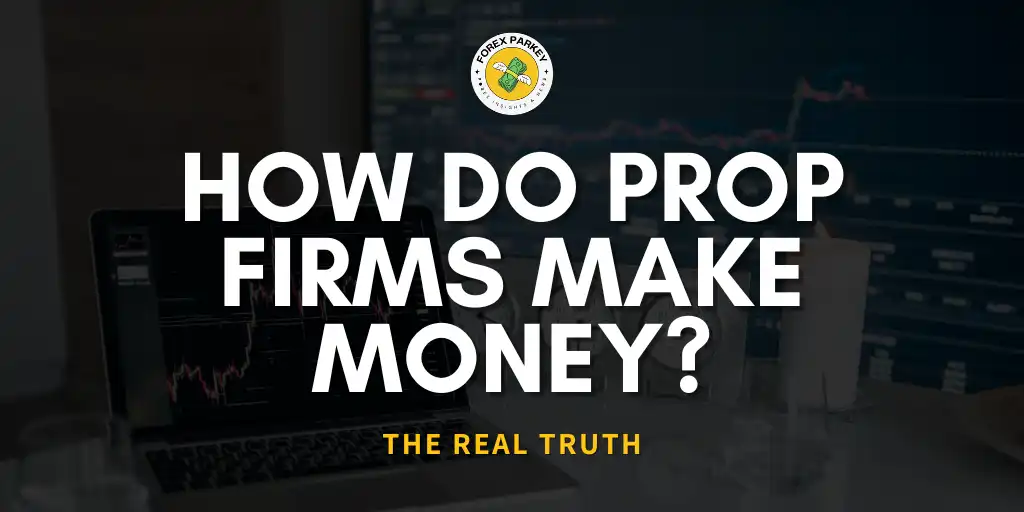Prop trading firms have exploded in popularity, providing traders access to significant capital and advanced platforms. But with traders keeping 50-90% of profits, how do prop firms make money?
This article peeks behind the curtain to uncover their business models.
We'll analyze major revenue streams like trading profits, fees from failed challenges, and educational subscriptions. You'll gain key insights into this booming industry, If you're an aspiring prop trader or just curious about how these firms operate sustainably.
So buckle up as we demystify the economics powering this trading phenomenon.
🔗 The Real Truth on How Do Prop Firms Make Money?

Prop trading firms provide traders access to significant capital and platforms, but how do they profit? We'll analyze their major revenue sources – trading profits, challenge fees, and subscriptions – to understand the economics behind this popular trading phenomenon.
Let's hop into this!
The main revenue stream for prop firms, and perhaps the most apparent, is the profits derived from trading activities. These firms employ traders who use the firm's capital to trade in various financial markets. The profits from these trades are then split between the trader and the firm, with the firm typically retaining a significant portion.
Many prop firms operate on a challenge model One Step Prop Firms, 2 Step Prop Firms, Instant funding models, where traders pay to take a trading challenge. If the trader manages to pass the challenge and receive a funded account, the fee is usually refunded. However, many traders fail these challenges, providing a steady stream of revenue for the prop firm.
Another common business model for prop firms is the profit split model. In this model, the prop firm and the trader share the profits from the trades made by the trader. The split can vary, but it's common for the firm to retain anywhere from 10% to 50% of the profits.
Similar to traditional brokerage firms, some prop firms charge commissions on trades made by their traders. This is usually a small percentage of the trade amount. Some prop firms may also charge monthly fees for access to their trading platforms or educational resources.
Some prop firms charge fees every time traders make a withdrawal from their funded accounts. This helps prop firms cover transaction costs and processing overhead. Firms also charge account inactivity fees if traders aren't actively using their funded accounts for a period of time. This helps prop firms free up unused capital to reinvest.
Many prop firms make additional income by selling educational products to aspiring traders. These include trading courses, mentoring programs, alert services, and more. Offering an educational track allows prop firms to generate revenue from traders who fail their evaluations while also improving the success rate of funded traders.
Overview of Prop Firms

Proprietary trading firms, or prop firms, are unique entities in the financial markets. Unlike traditional brokerage firms that execute trades on behalf of clients, prop firms trade their own capital.
This model allows them to take on higher levels of risk, but also potentially reap higher profits.
Types of Forex Prop Firms:-
There are several types of Forex prop firms, each with its own business model and way of operating:
Remote Prop Firms

These firms allow traders to work from anywhere in the world, providing them with access to trading platforms and capital. The traders are responsible for managing the trades and making profitable decisions.
The profits generated from these trades are then split between the trader and the firm. The split can range from 20-50%.
Remote prop firms are popular because they offer flexibility and the opportunity to trade with significant capital without requiring the trader to invest their own funds.
Arcade Prop Firms

These firms operate on a “pay to play” model. Traders pay a fee to take a trading challenge, which involves meeting certain performance criteria such as achieving a specific profit target or maximum drawdown.
If the trader successfully passes the challenge, they are allocated an amount of capital to trade with.
This model is beneficial for traders who are cautious about using their own funds or concerned about risk.
Institutional Prop Firms

These are large firms often affiliated with banks and hedge funds. They trade the institution's capital and have high barriers to entry. The trading decisions in these firms are often made by complex algorithms that analyze market conditions and execute trades.
These firms are known for their high-risk tolerance and vast amount of capital, allowing them to trade virtually anything in any market, including equities, forex, commodities, derivatives, or even more exotic financial instruments.
Each type of prop firm has its own unique characteristics, risk profiles, and ways of generating profits, making the world of prop trading a diverse and intriguing part of the financial landscape. Understanding these different types of prop firms and how they operate is crucial for traders looking to navigate this sector of the financial industry.
The Business Model of Prop Firms

Prop firms use their own capital to make trades, which sets them apart from traditional brokerage firms that handle client trades. This means that prop firms take on a higher level of risk because they are using their own funds. However, if successful, this can also lead to higher profits.
Prop firms employ various strategies such as merger arbitrage, index arbitrage, global macro-trading, and volatility arbitrage to maximize returns. They have access to sophisticated software and pools of information to help them make critical decisions.
Risk Management for Prop Firms

While prop firms can generate attractive profits, they also take on substantial market risk with their capital. As a result, risk management is paramount. Prop firms use a variety of methods to manage risk:
Consistent profitability relies on prop firms balancing profits earned against potential risks taken. Careful trader selection, rules-based trading frameworks, and dynamic risk monitoring are key.
The Role of Technology in Prop Firms
Technology plays a crucial role in the operations of prop firms. They invest heavily in technological capabilities to optimize their trading strategies. This includes sophisticated modeling and trading software that can analyze market conditions and execute trades automatically.
Questions You Might Want Answers For
How do Prop Trading Firms generate revenue?
Prop firms make money through trading profits, fees from failed challenges, and selling educational subscriptions.
What are Challenge Fees in Prop Firms?
Challenge fees are charged by prop firms for traders to prove their skills in a simulated environment.
Do Prop Firms charge for Educational Materials?
Yes, many prop firms sell educational subscriptions as a revenue stream.
Do all Prop Firms follow the same Business Model?
No, business models can vary, but most involve trading profits, challenge fees, and educational subscriptions.
🔗 End Note

Prop firms provide individual traders with an opportunity to access capital, platforms, and support to profit from the markets. By sharing profits with their traders while also generating income from fees and educational products, prop firms can build scalable and sustainable businesses.
So far, you might have got a great idea of How do Prop Firms Make Money?
Data With robust risk management procedures in place, prop firms are positioned to expand their trader base and assets under management. As traders continue to seek out funded accounts and evaluation challenges, expect prop firms to keep growing in popularity as an alternative to traditional brokerages. The future looks bright for this innovative segment merging trading and fintech.






